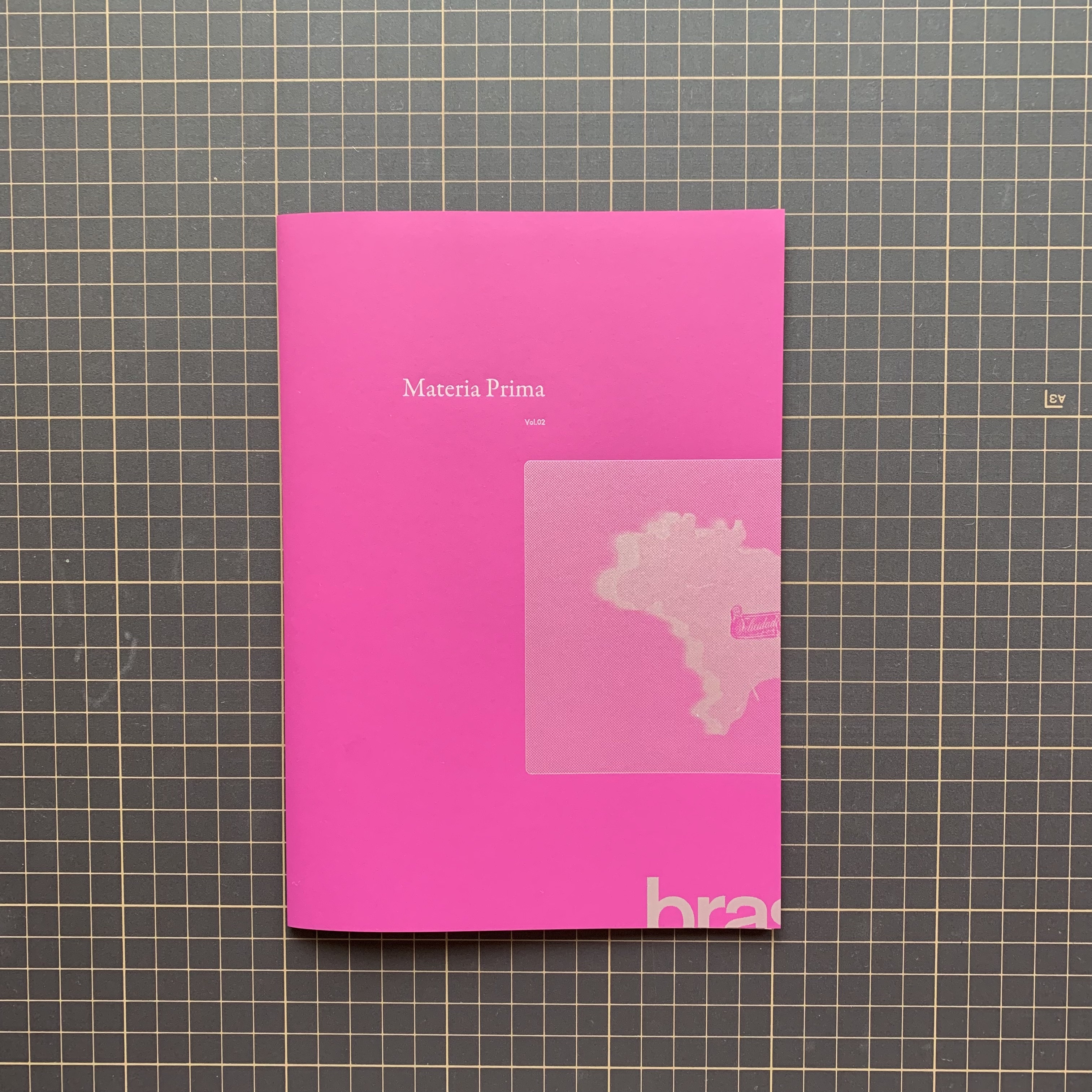
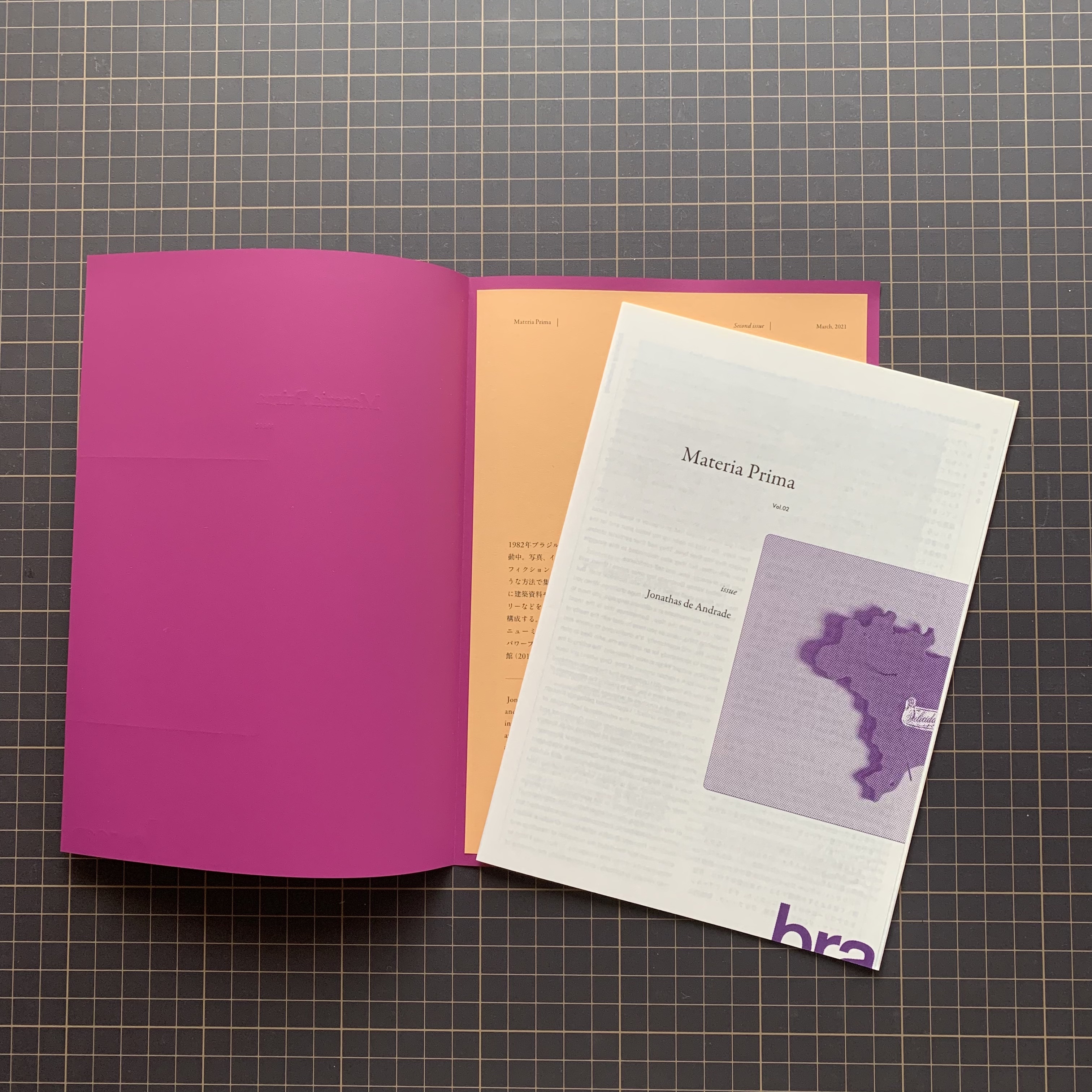
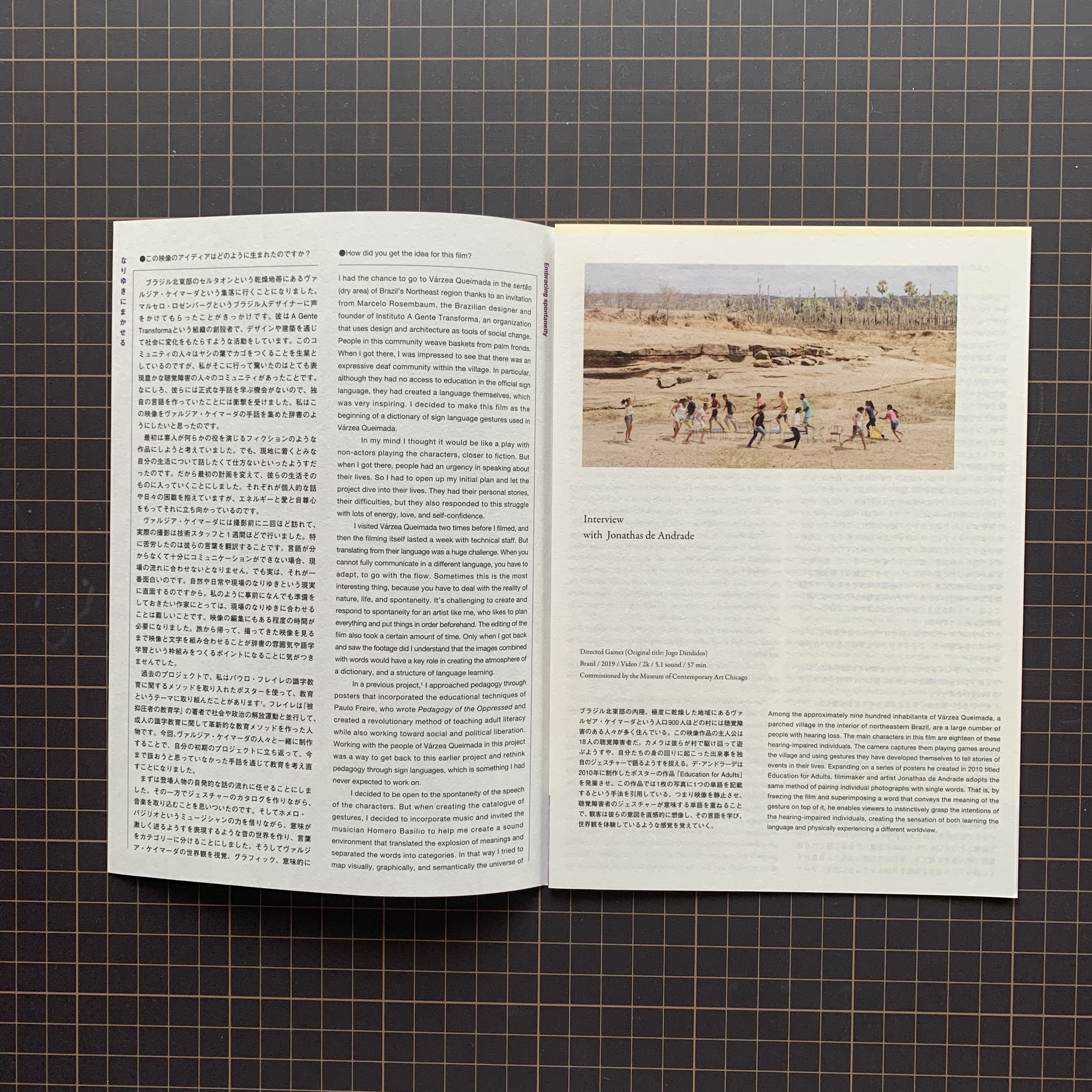
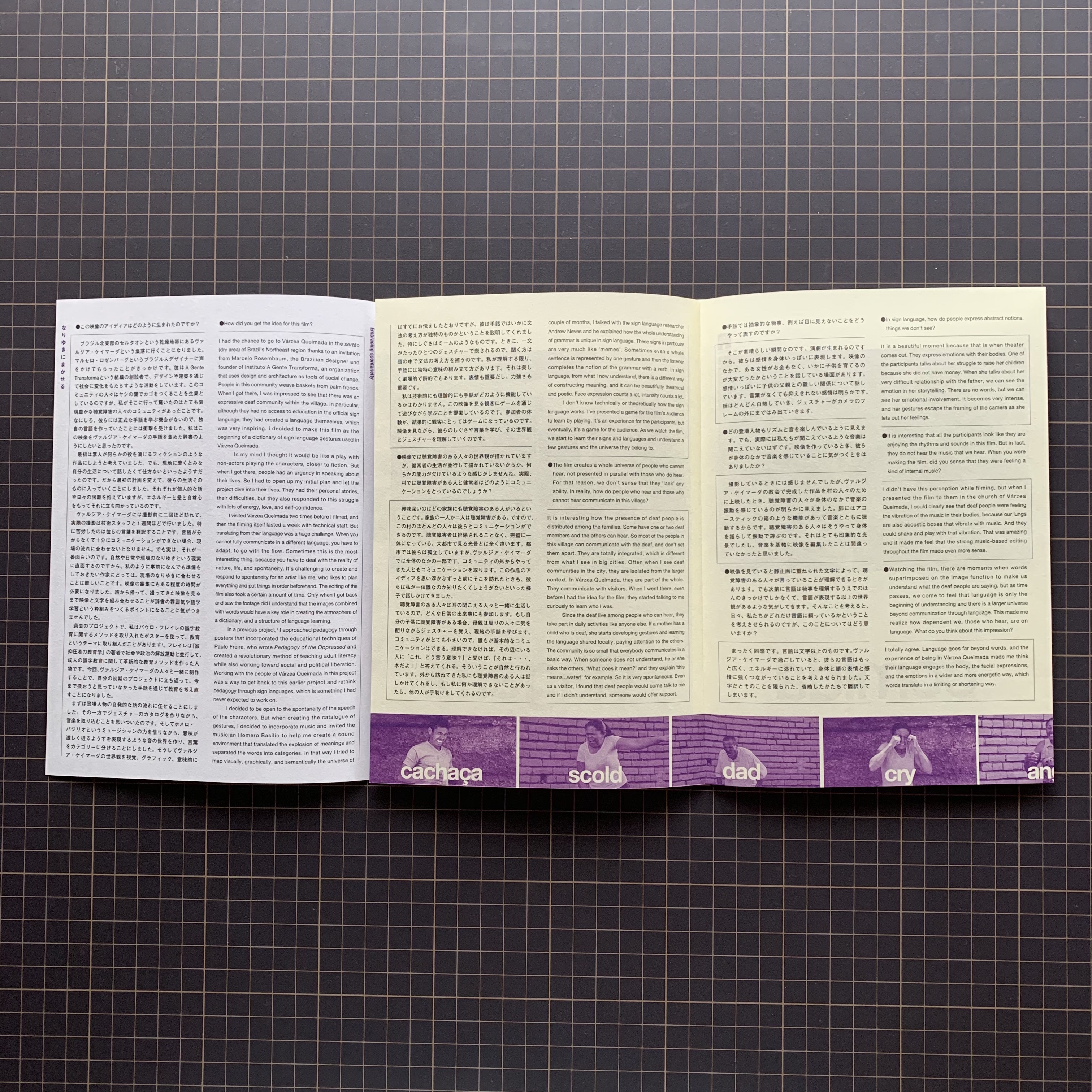
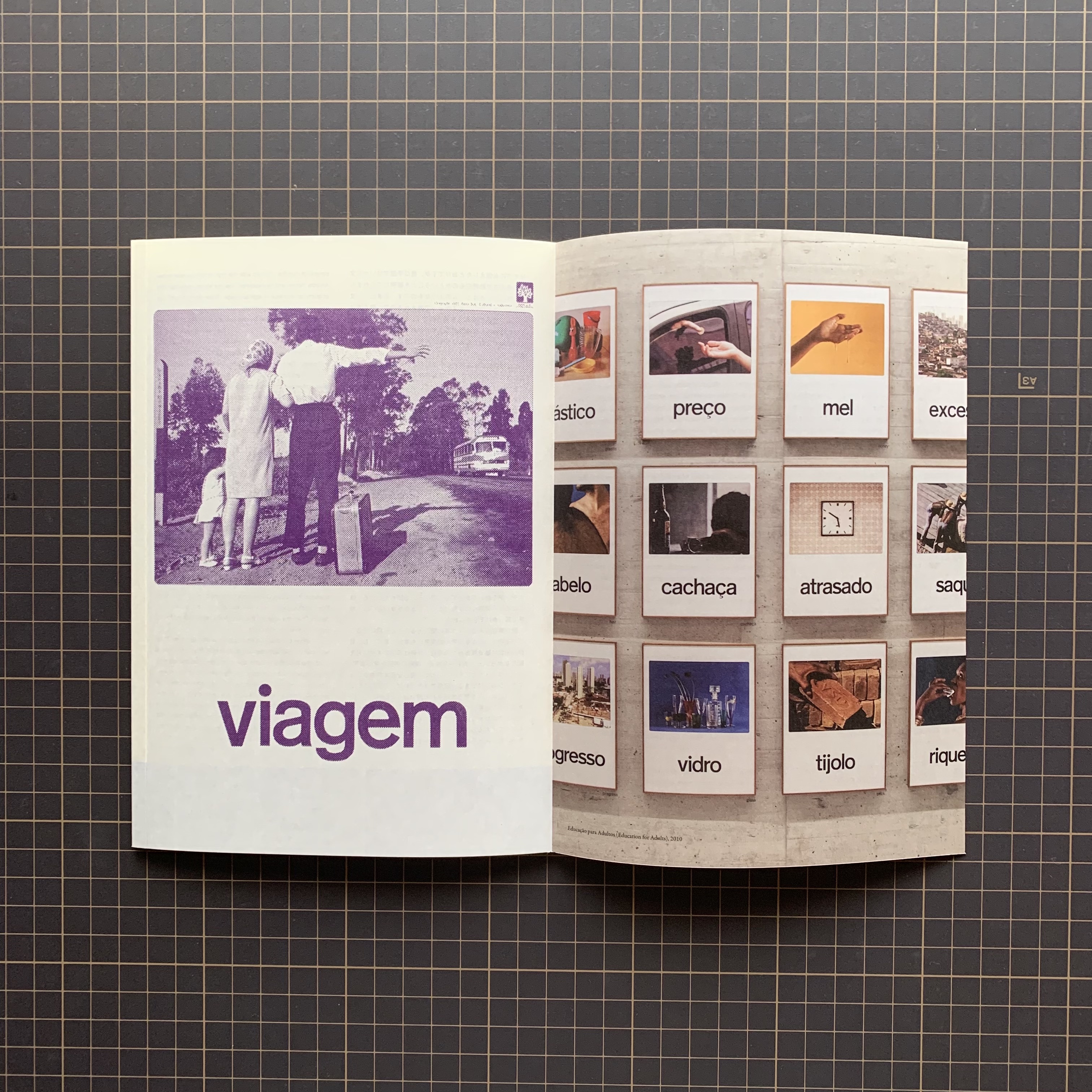
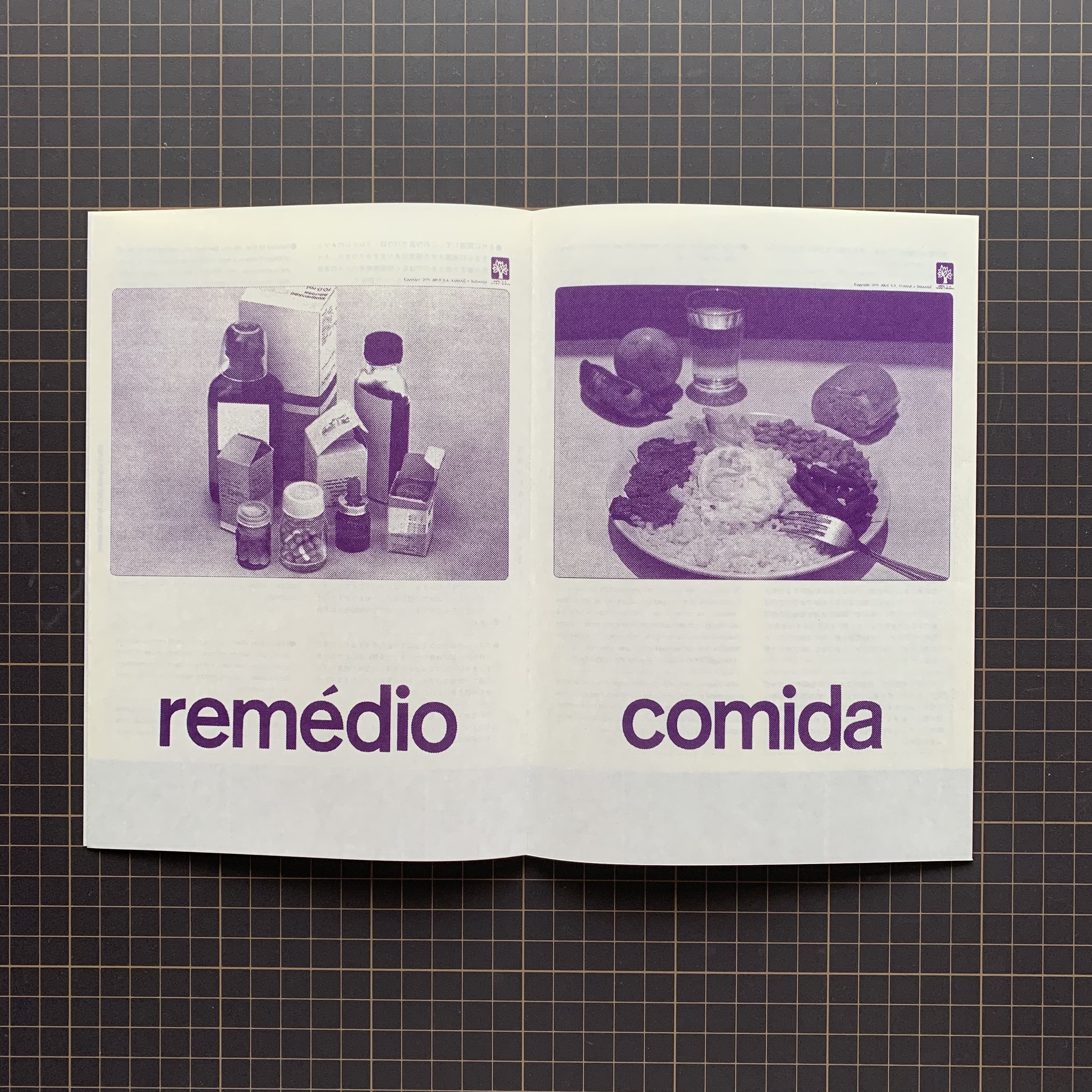
Materia Prima vol. 2 – ジョナタス・デ・アンドラーデ
判型: 片見出し8面折り製本 たとう紙/活版印刷
デザイン: サイトヲヒデユキ 制作編集: 永井佳子
価格: 1,650円(税込)
Materia Prima vol. 2 – Jonathas de Andrade
Design: Hideyuki Saito
Text and Edit: Yoshiko Nagai
1,500 JPY (without tax)
About small booklet ‘Materia Prima’
Materia Prima Vol.2 について / About Materia Prima vol.2
ないところから発明すること、家族を超えた人間関係、困難をチャンスに変えていくこと。常に響き続けているリズム。
Inventing from nothing, creating the relationship beyond family, turning obstacles into chances, together with the rhythm that is ever present in their body.
ブラジル人アーティスト、ジョナタス・デ・アンドラーデの作品「Directed Games(原題: Jogos Dirigidos)」を題材にその制作プロセスを聞いていきます。
We ask Brazilian Artist, Jonathas de Andrade, about his film work ‘Directed Games (Jogos Dirigidos)‘.
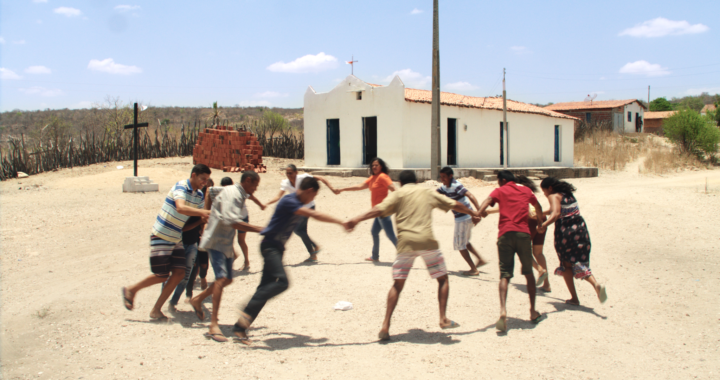
Directed Games (Original title: Jogo Dirididos)
( Brazil / 2019 / Video / 2k / 5.1 sound / 57 min )
Commissioned by the Museum of Contemporary Art Chicago
ブラジル北東部の内陸部にある人口900人ほどの村、ヴァルゼア・ケイマーダには聴覚障害のある人々が多く住んでいる。この映像作品は18人の聴覚障害を持つ住人が村を駆け回って遊ぶようすや、自分たちの身の回りに起こった出来事を独自のジェスチャーで語る場面を仕立て、撮影したもの。デ・アンドラーデはブラジル人教育学者パウロ・フレイレの教育のメソッドを発展させ、聴覚障害者のジェスチャーの理解を促すような言葉を伴った映像を制作。そうすることで観客は彼らの意図を直感的に想像し、その言語を学び、世界観を体験しているような感覚を覚えていく。
* オンライン上映会、2021年10月9日〜24日まで開催。詳しくはこちら。
Directed Games (Original title: Jogo Dirididos)
Brazil / 2019 / Video / 2k / 5.1 sound / 57 min Commissioned by the Museum of Contemporary Art Chicago
Among the approximately nine hundred inhabitants of Várzea Queimada, a parched village in the interior of northeastern Brazil, are a large number of people with hearing loss. The main characters in this film are eighteen of these hearing-impaired individuals. The camera captures them playing games around the village and using gestures they have developed themselves to tell stories of events in their lives. Expanding on a series of posters he created in 2010 titled Education for Adults that was inspired by the work of Brazilian educator Paulo Freire, filmmaker and artist Jonathas de Andrade here adopts the same method of pairing individual images with single words. That is, by freezing the film periodically and superimposing a word that conveys the meaning of the gesture on top of it, he enables viewers to instinctively grasp the intentions of the hearing-impaired individuals, creating the sensation of both learning the language and physically experiencing a different worldview.
* Online projection will be taken place from October 10-24, 2021. For more details.
ジョナタス・デ・アンドラーデ (Jonathas de Andrade)
1982年ブラジル、マセイオ生まれ。レシフェにて活動中。写真、インスタレーション、映像などを使い、フィクションとリアリティーに揺さぶりをかけるような方法で集団の記憶と歴史の境界を越える。さらに建築資料や画像、テキスト、人々のライフストーリーなどを集めて分類し、過去の個人的な物語を再構成する。
Jonathas de Andrade (b. 1982, Maceió, Brazil) lives and works in Recife, Brazil. He uses photography, installation and video to traverse collective memory and history, making use of strategies that shuffle fiction and reality. De Andrade collects and catalogues architecture, images, texts, life stories and recomposes a personal narrative of the past.



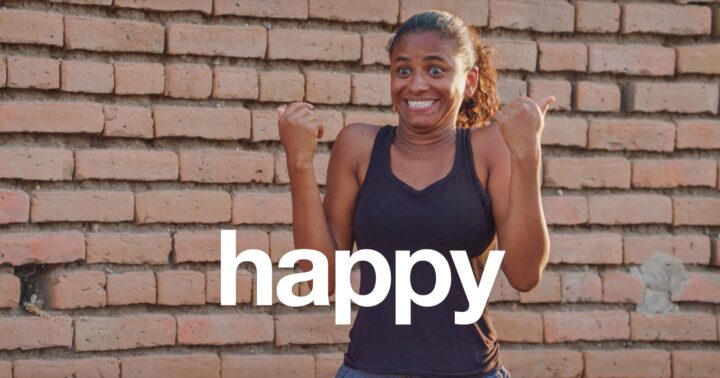
― 手話をわかるようになるまではどのくらいかかりましたか?
実際には周りの人の手助けが必要でした。それがなかったら、あまりよくわかりませんでした。私は自分が作りたい映像に関してははっきりとしたアイディアがあって、そのことを何の問題もなく伝えることができると思っていました。だけど、現地についたら、全くできない。彼らがやって来て始めても、コミュニケーションができないから状況をコントロールすることができないんです。結局、この映像作品を自分のものにしたのは彼らです。そのことが素晴らしいと思いました。彼らの言語は完全に独立している。そしてときに私たちは全く分り合うことができない。このコントロールの欠如が撮影を進めていくのにとても大切なことでした。
― 映像を見ていると静止画に重ねられた文字によって、聴覚障害のある人々が言っていることが理解できるときがあります。でも次第に言語は物事を理解するうえでのほんのきっかけでしかなくて、言語が表現する以上の世界観があるような気がしてきます。そんなことを考えると、日々、私たちがどれだけ言語に頼っているかということを考えさせられるのですが、このことについてはどう思いますか?
まったく同感です。言語は文字以上のものです。ヴァルジア・ケイマーダで過ごしていると、彼らの言語はもっと広く、エネルギーに溢れていて、身体と顔の表情と感情に強くつながっていることを考えさせられました。文字だとそのことを限られた、省略したかたちで翻訳してしまいます。
(Materia Prima vol.2 本文より抜粋)
* このインタビューはHamacho Liberal Artsでのトークをもとに編纂したものです。
- How long did it take for you to understand the sign language?
Actually, I needed the help of people around me. Without that, I couldn’t understand very well. And that was funny because I had a clear idea about the film and imagined I would communicate well with them. But when I got there it was not easy at all. They came, we started, but I could not control the situation because I could not communicate. In the end, they owned the film, which was very beautiful. Their language was completely independent. And sometimes we didn’t understand each other. This lack of control was super important in the development of the film.
- Watching the film, there are moments when words superimposed on the image function to make us understand what the deaf people are saying, but as time passes, we come to feel that language is only the beginning of understanding and there is a larger universe beyond communication through language. This made me realize how dependent we, those who hear, are on language. What do you think about this impression?
I totally agree. Language goes far beyond words, and the experience of being in Várzea Queimada made me think their language engages the body, the facial expressions, and the emotions in a wider and more energetic way, which words translate in a limiting or shortening way.
(Extract from Materia Prima vol.2 / This dialogue is taken place during the event of Hamacho Liberal Arts and later edited by artist and curator)
